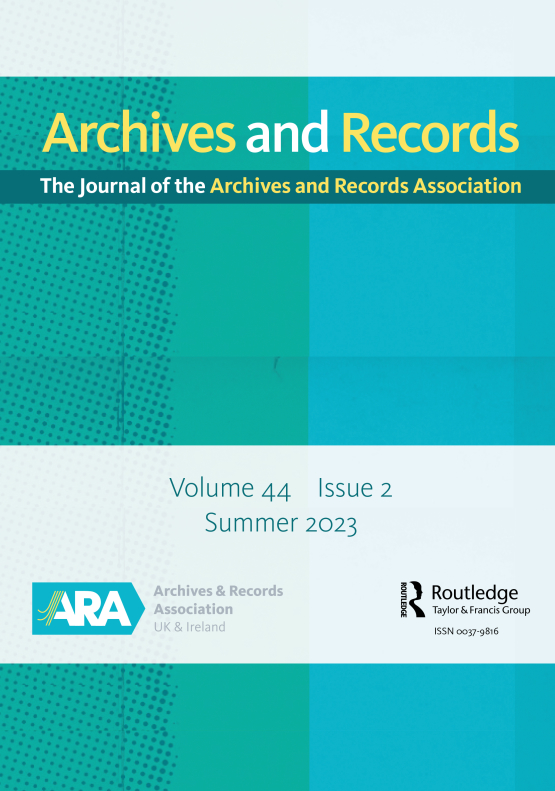Submit a Manuscript to the Journal
Archives and Records
For a Special Issue on
Trauma-Informed Approaches to Archives and Records
Abstract deadline
Manuscript deadline

Special Issue Editor(s)
Dr Anna Sexton,
University College London, UK
a.sexton.11@ucl.ac.uk
Dr Jennifer Douglas,
The University of British Columbia, Canada
jen.douglas@ubc.ca
Kristen Wright,
The University of Melbourne, Australia
kirsten.wright@unimelb.edu.au
Nicola Laurent,
The University of Melbourne
nicola.laurent@unimelb.edu.au
Trauma-Informed Approaches to Archives and Records
For this special issue we invite scholars to submit articles that explore new theoretical, historiographical, empirical or methodological insights on the relation between trauma and archives and the application of trauma-informed approaches to archives and records work.
Sitting within a broader ‘affective turn’ in archival discourse, there has been a recent growth in scholarship examining ‘trauma’ as an explanatory category of relevance to archivists and all those who are represented in, are related to, or who encounter archives and records. Of note within this emerging discourse, in 2021, Kirsten Wright and Nicola Laurent introduced a set of trauma-informed principles as part of an overarching trauma-informed framework for archives and records work[i]. This issue seeks to extend and deepen the scholarship around trauma as an explanatory category for archives and records work and seeks to examine how the field has responded to the call embedded in trauma-informed frameworks for a fundamental shift in practice. The issue also seeks to embrace scholarship that does not begin with, or rely on, Western framings of trauma in describing and addressing the potential for psychological, emotional and spiritual harm in archive and record encounters.
Trauma-informed frameworks as applied to archives and records (and broader literatures exploring ethics of care) highlight the varied agents and actors who may be affected to different degrees by the traumatic potentiality of archives and records. Traumatisation is increasingly recognised as an occupational hazard for archives and records workers, and there is a growing body of scholarship that surfaces affective ramifications for those represented in records, as well as creators, donors, communities and researchers. We encourage submissions from across these relational positions and perspectives. We also encourage submissions from colleagues in broader cultural heritage settings including libraries, museums and arts-based contexts that might reflect on the applicability of perspectives and approaches from these specific sectors for archives and records work.
As drawn out in literature both within and outside of the archival field, becoming a trauma-informed organisation or service involves a deep commitment to changing how the organisation or service is structured, how staff are enabled and supported, whose needs are prioritised, and how services operate. We welcome deep and reflective case studies (including on work-in-progress) from institutions, community groups and individuals invested in embedding trauma-informed principles and frameworks across archive and record related services and work to open out discussion on the benefits and challenges of seeking to enact this kind of change. We also welcome case studies illuminating broader approaches to centring affected communities, embedding an ethics of care, reducing harms and enacting liberatory and healing focused archives and records services and work. This might include approaches that draw on Indigenous studies, critical race studies, gender and sexuality studies, queer theory, trans theory, disability studies, and/or other critical perspectives. We encourage submissions highlighting international perspectives and we also welcome reflections on how uncertain or challenging social, cultural and political climates impact on the possibilities of doing this kind of work.
Potential topics include, but are not limited to:
- Trauma as an explanatory category and frame for archives and records work
- The relation between individual and collective trauma and approaches
- The link between trauma-informed practice, person-centred archives and ethics of care
- Library, museum and arts-based applications of trauma-informed approaches and their applicability to archives and records contexts
- Surfacing perspectives from those most affected by the traumatic potentiality of records
- Developing/adapting trauma-informed principles and frameworks for specific national/regional/local/institutional contexts
- Mitigating the impact of secondary trauma on archive and records workers
- Benefits and challenges of enacting trauma-informed approaches across different aspects of service delivery
- Examination of specific areas of practice (e.g. appraisal, cataloguing, access) through a trauma-informed lens
- Education and training for archive and records management professionals in trauma-informed approaches
- Enacting liberation, healing and repair beyond western framings of trauma
[i] Wright, Kirsten, and Nicola Laurent. 2021. “Safety, Collaboration, and Empowerment: Trauma-Informed Archival Practice”. Archivaria 91 (June), 38-73. https://archivaria.ca/index.php/archivaria/article/view/13787
Submission Instructions
Articles should be no more than 8,000 words (including footnotes and references) and written in accordance with the style guide and reference guide (Chicago endnotes and bibliography) provided by Archives and Records. For an informal discussion about publishing in the special issue, contact a.sexton.11@ucl.ac.uk
In the first instance, please send a 500 words (maximum) proposal to: a.sexton.11@ucl.ac.uk, by 7 May 2025. Proposals should contain a brief outline of the proposed article, up to five key words, a title and author affiliations.
All submissions will be double-blind peer reviewed prior to acceptance for publication. An invitation to submit an article does not guarantee publication in the final issue. All submissions should be presented in line with the Archives and Records Instructions for Authors.
Submission deadlines can be found at the top of this page. Invited articles will form the Archives and Records Special Issue, 47-2 (Spring, 2026)
